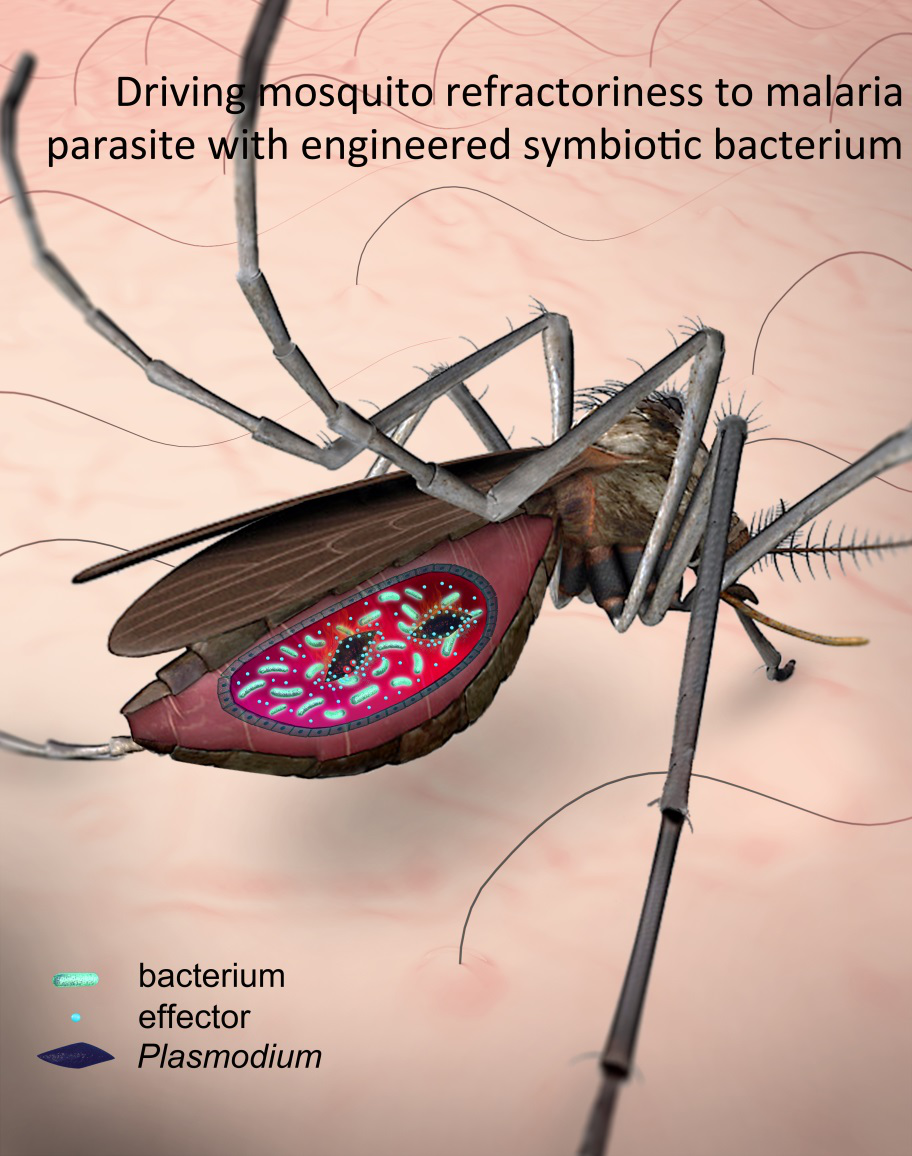
Malaria, one of the most devastating infectious diseases worldwide, is caused by Plasmodium parasites that are transmitted through the bite of infected female anopheline mosquitoes. Current approaches for controlling malaria include vector control and anti-malarial drugs.
Evidently, with the increasing resistance of malaria parasites to drugs and of mosquitoes to insecticides, the solutions are not sufficient for malaria control, and new weapons are urgently needed. A new approach being considered is not to kill the mosquito, but instead to convert it into an ineffective malaria vector.
Previous studies have shown great promise of a new strategy, paratransgenesis, involving the use of genetically modified mosquito symbiotic bacteria to deliver anti-Plasmodium effector molecules to mosquitoes. However, a major unresolved challenge still remains to devise means to spread such bacteria throughout mosquito populations.
Recently, a joint research team led by Prof. WANG Sibao at Shanghai Institute of Plant Physiology and Ecology of Chinese Academy of Sciences, and Prof. Marcelo Jacobs-Lorena at Johns Hopkins University, has developed a promising way to stop mosquitoes spreading malaria. The study was published in Science.
In this study, researchers identified a new bacterium strain (AS1) of the genus Serratia isolated from Anopheles ovaries. Serratia AS1 fed to adult mosquitoes stably colonizes the mosquito midgut, crosses the midgut epithelium and colonizes reproductive organs (ovaries and accessory glands). When fed to male mosquitoes, AS1 bacteria colonized their accessory glands, and were venereally transmitted from males to females via mating. Moreover, Serratia AS1 is vertically transmitted from female to larval progeny via attaching to laid eggs, primarily on the chorion ridges and floats. These bacteria propagated in the water and were ingested by the larvae that hatch from these eggs.
The results demonstrated that this bacterium can spread rapidly throughout mosquito populations, and persist for subsequent multiple generations. Moreover, Serratia AS1 can be genetically manipulated for secretion of anti-Plasmodium effector molecules by use of the Serratia HasA (heme-binding protein) exporting system, and the recombinant strains strongly inhibit development of the human malaria parasite Plasmodium falciparum in mosquitoes, but do not have an obvious negative impact on mosquito longevity or fecundity and fertility.
Therefore, Serratia AS1 makes it possible to develop a powerful tool for driving mosquito refractoriness to Plasmodium infection in the field, and thus provides means to translate the bench findings to the field application. This study not only contribute to malaria combating, but also help come up with new ideas for prevention and control of other mosquito-borne diseases and plant diseases.
This study was supported by the Strategic Priority Research Program of the Chinese Academy of Sciences, the National Nature Science Foundation of China, and National Institute of Allergy and Infectious Diseases of USA.

Figure: A symbiotic bacterium AS1was genetically engineered for secretion of anti-Plasmodium compounds that arrest development of the parasite in the mosquito gut. (Image by Dr. WANG's lab)

86-10-68597521 (day)
86-10-68597289 (night)

52 Sanlihe Rd., Xicheng District,
Beijing, China (100864)

